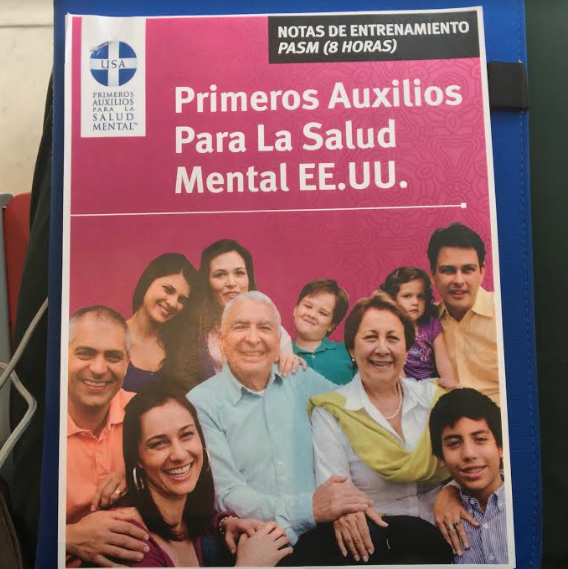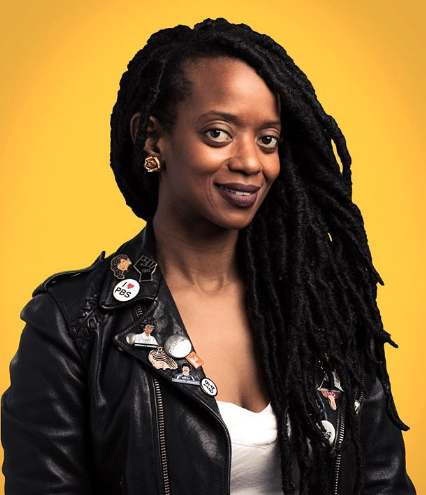Welcome to another round of Mental Health Monday, your weekly dose of stories, resources, and motivation for your everyday life. Last week, Jenifer Lewis opened up about overcoming sex addiction and bipolar disorder, Jihan Thompson talked about why it can be hard for Black women to find a therapist, Zack McDermott reflects on his public breakdown, Dwan Carter addresses the realities of suicide among Black teens, and Rev. Jacqui Lewis wrote about growing up being Black and depressed. and you should definitely read it.
Because it's always a good time for celebrating winning-ass Black folks, here is Tiffany Haddish's monologue from this weekend's episode of Saturday Night Live.
EVENTS:
Portland, OR. A Discussion on Black Trauma, Mental Health, and Self Care. November 16 @ 5:00PM - 6:30PM
Please join the Urban League Young Professionals for an in depth and open facilitated discussion with Cascadia Behavioral Healthcare on black trauma, black mental health, and self care. Wine, beer, and light refreshments will be served. Info and RSVP
Atlanta, GA. The Key: A discussion about the tools needed for the mental, physical and economic health of Black men. @ November 18 @ 2:00 PM – 4:00 PM
Join us as we discuss black men in the context of hiphop culture. The Key is a discussion about the tools needed for the mental, physical, economic, emotional, sexual and legal health of Black men. From JDilla's Lupus, to Meek Mills' unfair sentencing to Pimp C's and Nate Dogg's untimely death and Kanye's breakdown, let's discuss the importance total health of men of color. Info and RSVP
THIS WEEK'S GOODNESS:
Troubled by the death of Melissa Wright’s mother, the Wright family goes through unforeseen obstacles that begin to hinder all of their family relations. While this is occurring, the Love family enters their lives. In every mysterious way possible, they go from good to bad. This series touches on how your past can affect your future and the mental illnesses of anger, alcoholism, greed, and depression.
"When a Breakdown Is Public (or, That Time My Mom Was on WorldStarHipHop)" by Angela Helm [The Root]
Soon after that, my best cousin Chanise said she wanted to talk to me. She revealed that “Aunt Teddie was on WorldStarHipHop,” and the family didn’t know how to tell me. I looked up at her in half amusement (like, word?) and half horror. Oh Lord. Within days, people all over the country were hitting me up, friends and family, telling me that they’d seen my mom on WorldStar (who knew that shit was so popular?). Her video has been viewed more than half a million times (something I think my mother is slightly proud of), but to me it was crass, it was ugly. It was personal.
It was my mother.
To Love Does Not Mean To Endure Abuse by Katrina [Manifesting ME]
The narrative I’m speaking of is the ‘ride-or-die’ narrative. A narrative typically aimed at women which encourages and praises them for sticking by their partner’s side through everything without wavering. This often means being cheated on, lied to, manipulated, humiliated, and disrespected but still holding this person down. It is a narrative presented in many songs, shows, movies, etc and it is often aimed at women of color.
And quite frankly I’m tired of it!
To coincide with Children's Grief Awareness Month, Da Brat's story of losing her father as a young girl was featured by A Legacy Left Behind (here).
"How Code Switching Is Turning Black People Into Method Actors" by Hakim "Kimo" Hill [Blavity]
Over the last year, my partner Cliff Notez and I, have been going to universities with two of our films about black mental health, and doing workshops with students and faculty about coping skills and trauma. A lot of these students have an unmatched grind, trying to be full-time students, full-time workers, full-time friends, children and, sometimes, parents. Often times, code switching in between all of them, their multiple personalities leaked into each other, causing a stress that can lead to depression.
"Not White, Not Rich, and Seeking Therapy" by Olga Khazan [The Atlantic]
She found 28 percent of white, middle-class callers were called back and offered any appointment, compared to just 17 percent of African-American, middle-class callers. Only eight percent of the working-class callers of either race were offered an appointment. When therapists offered appointments in the ideal time slot—weekday evenings—the wealthier, white callers prevailed once again.
Kugelmass also found subtle differences by gender, with the odds largely stacked against black men.
"9 Things to Do When Having Suicidal Thoughts" (.pdf file) [Lion Heart Life Healing]
WRITE DOWN THINGS THAT YOU WANT TO END -Sometimes we become suicidal because we want to end things, not ourselves. Write down things that you want to change in your life and if you feel up to it, write out a plan to change those things.
If you have a mental health resource, event, or piece of content we should know about, step into our office. You da bess.

































Mental Health First Aid teaches ye to recognize signs and symptoms of someone developing a mental health or substance use disorder and a five-step action plan to help.